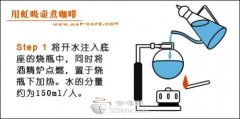Kopi Luwak is expensive: 6 wonderful uses of inventory of animal droppings
Ingenious use one: high-end drinks
Example: Kopi Luwak
Kopi Luwak, also known as civet coffee, is one of the most expensive coffees in the world. The price per jin ranges from US $300 to US $800 and is abundant in Indonesia and other places. It costs 200 to 300 yuan to drink a cup of Kopi Luwak in Hong Kong, and it is only available in one or two of the most exclusive hotels. Kopi Luwak has become a "coffee upstart", attracting coffee fans more than the traditional top Jamaican Blue Mountain coffee. This kind of coffee is actually baked from the droppings of arboreal wild animals commonly known as "civet cats" in Indonesia.
The civet likes to choose the most ripe, sweet, fat and pulpy coffee fruit in the coffee tree as food. The coffee fruit passes through their digestive system, the flesh outside the fruit is digested, and the hard coffee beans are excreted intact through the civets' digestive system. After this digestion process, the coffee beans have undergone unparalleled miraculous changes-as the bitter proteins in the coffee beans are digested, the Kopi Luwak tastes much less bitter and has a bit more round and mellow taste.
Early Indonesian farmers regarded civets that specialize in eating ripe coffee fruits as mortal enemies, but I don't know which one dared to eat crabs on a whim and picked coffee beans from the civet droppings to make coffee, which was processed and roasted. The coffee made by the world and experts is full of praise.
Ingenious use two: precious spices
Example: Ambergris ambergris
Ambergris is a spice containing 25% ambergrin. When added to the perfume, it will form a film on the skin, which can make the fragrance last for a long time. Historically, it has been used as a deodorant for perfumes. It not only has a clear and elegant animal aroma, but also with a hint of soil and moss fragrance and other special sweetness. Its main components are ambergris alcohol, benzoic acid, trihydropropyl ionone and so on. It is also a valuable traditional Chinese medicine, which has the effects of resolving phlegm, dispersing knots, benefiting qi and promoting blood circulation. Ambergris is also the most mysterious spice, which is only occasionally picked up by the sea at first. Because it is rare and difficult to find, ambergris is also known as "gray gold" and "liquid gold". At first, people thought it was the drool of the "dragon" in the sea while sleeping, so it got its name. Scientists have found that it actually comes from a huge creature in the ocean-the sperm whale.
Sperm whales can dive to a depth of thousands of meters and feed on giant marine life such as squid and octopus. After swallowing food, sperm whales find it difficult to digest the hard, sharp horny beak and cartilage in their bodies. The stomach and intestines of sperm whales are cut and ground by these hard objects, and they can only produce some special secretions through the digestive tract to wrap around those sharp objects to relieve the pain of the wound. Every once in a while, these secretions are excreted with the feces and eventually float on the sea to become ambergris.
In fact, the ambergris that has just been excreted is not fragrant, even with the pungent and unbearable fishy smell of feces, but after the caress of the waves, the exposure of the sun, and the catalysis of the air, it finally becomes odorous and unbearable.
Ingenious use 3: cultivate tree species
Ex.: bird droppings in Dodo
The African island nation of Mauritius once had two endemic creatures: the dodo and the olive tree. The dodo is a large, slow-moving, flightless bird that is now extinct. The big cranial olive tree is a kind of precious tree with tall and straight trunk, hard wood and fine grain. Around 1693, when the last dodo disappeared, it was found that the large cranial olive was also suffering from "infertility". By the 1980s, only 13 precious large cranial olive trees were left in Mauritius. Anxious scientists finally found an existential relationship between the big cranial olive and the dodo: the dodo ate the fruit of the tree, and the pulp and hard shell outside the seed were digested through the dodo's digestive system before the seeds discharged from the body could germinate. It was only then that scientists came up with a way for the spit chicken to eat the fruit of the big cranial olive tree to replace the dodo and make the tree survive.
Ingenious use 4: use medicine to treat diseases
Ex.: night bright sand, moon sand, Wulingzhi
Chinese medicine experts point out that the feces of many animals are Chinese herbal medicines with excellent curative effects, and some of them are even quite valuable. As early as the Eastern Han Dynasty, the synopsis of the Golden Chamber by Zhang Zhongjing, the medical saint, recorded the prescriptions for the treatment of diseases by animal droppings, such as chicken arrow white, male rat droppings, roast dog droppings, horse droppings, cow droppings (cattle dung) and so on. Li Shizhen compiled the Compendium of Materia Medica, in which there are as many as 51 kinds of animal faeces, involving birds, animals and 32 kinds of animals, including human beings.
The records include: pig dung, pig zero, treatment of infantile diarrhea, millet in famous feces, treatment of infantile diarrhea and anorexia, donkey dung treatment of menstrual water, camel dung, external use, stopping epistaxis, lion dung to break persistent blood, killing larvae, tiger dung to treat gangrene and hemorrhoids, deer dung to treat dystocia, cat dung to treat invagination of acne, wolf dung to treat bone droppings, and monkey dung to treat children's umbilical wind. Pigeon dung, known as Zuopanlong, treats scabies; white cloves, that is, sparrow feces, is warm, bitter, toxic, can relieve stagnation and treat hernia, pterygium and pterygium, treat women with it; swallow dung to treat five feet and urination; peacock dung to treat leucorrhea and urination is disadvantageous; eagle dung to treat accumulation, kill tuberculosis insects; and so on.
Interestingly, the ancients also gave some interesting nicknames to the droppings of some animals. For example, it has the effect of bright suicidal worms, which can treat hare droppings with dark nebula, eczema, hemorrhoids and fistulas, which is called "Wangyue sand". Bat feces, which can be used to treat internal and external nebula, eczema and other diseases, is called "night bright sand". It has the effect of promoting blood circulation and removing blood stasis and regulating blood qi, which is used for the treatment of rodents (cold birds) or flying squirrels after being bitten by poisonous insects such as snakes, scorpions and centipedes, which is called "Wulingzhi".
Ingenious use five: ancient contraception
Example: crocodile dung contraceptive
Thousands of years ago, the Egyptians invented various contraceptive techniques, such as the contraceptive they wrote down on papyrus, using the droppings of crocodiles, bees and sometimes frankincense (a resin), aloe and even milk. The suppositories prepared by this prescription can be placed in the cervix and vagina for contraception, which is "the earliest contraceptive in human history."
It is said that the ancient Egyptians thought that animals such as crocodiles and elephants had mysterious powers, so they were used in contraceptives. However, from a scientific point of view, this method is the same as the basic principles of modern contraceptives, such as topical contraceptive ointment and contraceptive suppositories. Crocodile dung is strongly acidic and does have a certain spermicidal effect, so its contraceptive effect is very likely to be effective. However, due to the strong smell of animal faeces, this method of contraception has become "extinct". Instant Coffee
Clever use 6: cleaning products
Example: cow dung toothpaste, camel urine shampoo
It was reported earlier that Berbers in Tunisia like to brush their teeth with cow dung. The invention has even been made into toothpaste, a daily necessities peculiar to Berbers.
The practice of cow dung toothpaste is roughly as follows: they sun the cow dung until it is as hard as a stone, grind it into a fine powder, mix some spices and minerals, dip it with mint sticks, and clean the surface and crevice of the teeth. The compound is said to strengthen teeth, whiten teeth and prevent gingivitis. This toothpaste is really good for Berbers who eat meat all the year round.
The nomadic Bedouins in the Sahara desert of North Africa also like to wash their hair with the famously smelly camel urine. Locals say that the desert climate is bad, there is a serious shortage of water, and most Bedouin people have white lice in their hair, and camel urine happens to have an excellent function of killing lice, so it is chosen by them as "shampoo." It is said that the hair washed with camel urine is instructive, and washing the face with it can make the skin smoother. This "beauty law", which originated in ancient Egypt, spread throughout North Africa and the Arabian Peninsula. It is said that the famous Cleopatra used to wash her hair with lion urine.
Front Street Cafe: http://www.gafei.com/
Important Notice :
前街咖啡 FrontStreet Coffee has moved to new addredd:
FrontStreet Coffee Address: 315,Donghua East Road,GuangZhou
Tel:020 38364473
- Prev

Usage of siphon pot with common sense of coffee
The siphon pot (Syphon), also known as the plug pot, always seems to remind people of the utensils of chemical experiments.
- Next

Definition of freshness of foreign coffee
1. Raw coffee beans: can stay fresh for 50 years (to be verified); 2. Whole roasted coffee beans: begin to lose flavor after two weeks (correct solution); 3. Coffee powder: lose flavor 15 minutes after grinding (this is the charm of freshly ground coffee); 4. Brewed coffee: it must be poured out after 30 minutes (not necessarily, think about ice drop coffee) good coffee, must be ground freshly
Related
- Beginners will see the "Coffee pull flower" guide!
- What is the difference between ice blog purified milk and ordinary milk coffee?
- Why is the Philippines the largest producer of crops in Liberia?
- For coffee extraction, should the fine powder be retained?
- How does extracted espresso fill pressed powder? How much strength does it take to press the powder?
- How to make jasmine cold extract coffee? Is the jasmine + latte good?
- Will this little toy really make the coffee taste better? How does Lily Drip affect coffee extraction?
- Will the action of slapping the filter cup also affect coffee extraction?
- What's the difference between powder-to-water ratio and powder-to-liquid ratio?
- What is the Ethiopian local species? What does it have to do with Heirloom native species?

